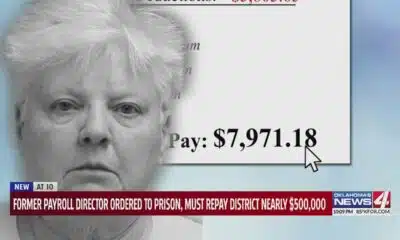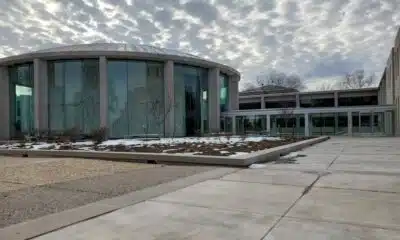News from the South - Louisiana News Feed
10 years after winning marriage equality, Jim Obergefell wants to aim higher
by Kate Sosin, The 19th, Louisiana Illuminator
June 27, 2025
It happened just a few weeks ago: Jim Obergefell was moving things in his office when he came across the ashes of his late husband, John Arthur, now 12 years gone. Arthur had last wishes for his ashes. Obergefell had yet to fulfill them.
“And it struck me that, oh, I am actually now mentally, emotionally ready to take care of John’s ashes,” Obergefell told The 19th. “It was the first time that I had that feeling so clearly and so strongly.”
Obergefell, 58, is ready to move on. Not exactly from the love of his life or the history-making Supreme Court decision that came after Arthur died. But certainly from the insecurities straight America was grappling with a decade ago about same-sex unions.
Obergefell is that Obergefell: the named plaintiff in the landmark lawsuit that extended marriage equality to every state in the nation in 2015. Ten years later, he celebrates that win and the many ways it rewrote his life. And in a time when LGBTQ+ rights are again under assault, he is looking to the future — of the queer rights movement and also his own.
A journey to the Supreme Court
Obergefell’s journey to the Supreme Court was hardly destined. It began 12 years ago, on June 26, 2013, when the Supreme Court struck down the Defense of Marriage Act, a federal law that prohibited the government from recognizing same-sex marriages.
Obergefell and Arthur had been together for 21 years at the time. The two had discussed getting married before. But they wanted it to be legal, and their home state of Ohio didn’t offer same-sex marriages.
Arthur was gravely ill with ALS, a progressive neurodegenerative disease, and he barely left his home hospice bed.
After the ruling, Obergefell leaned over to Arthur, hugged, then kissed him.
“Let’s get married,” he said.
Arthur agreed.
The logistics were not easy. Arthur was in no shape to travel, and the couple could not wed in Ohio. Obergefell researched and found that Maryland would let him get a marriage license even with only one of them present. But both would need to arrive in the state for the ceremony.
When friends and family learned about their predicament, they pooled together money to charter a medical jet for Arthur. The two flew to Baltimore. Over the course of 45 minutes, they exchanged vows on the tarmac before flying home.
“In the days that followed, we said the word ‘husband’ hundreds of times a day,” Obergefell said on the Decidedly Podcast in 2023.
But just five days later, their joy was muted when civil rights attorney Al Gerhardstein informed them that because of Ohio’s ban on same-sex marriage, Arthur would be listed as single in death.
Arthur and Obergefell were angry. The couple sued the state of Ohio in federal district court and won. Three months later, Arthur died.
The following year, Obergefell, still in mourning, lost on appeal. But he refused to believe he might lose altogether.
“I just kept going,” Obergefell said. “It was the right thing to do.”
On June 26, 2015, he won. For the country, the win was immensely practical. Many told Obergefell it gave them so much hope it saved their lives. For Obergefell, it meant a legacy for the man he loved.
“I made promises to John to love, honor and protect him, and I was going to keep doing that,” he said.
Changing history
It’s difficult to overstate the impact of Obergefell’s case on the nation or the world. Since the 2015 ruling, the Williams Institute at the UCLA School of Law estimates, 591,000 queer couples have wed, generating an estimated $5.9 billion in wedding spending for state and local economies.
It has also radically transformed Obergefell’s life. Introverted and unassuming, he has spent the last decade campaigning for LGBTQ+ rights. He helms Equality Vines, a wine company that donates its proceeds to advancing civil rights causes.
It’s a position that makes him deeply proud if not a little fatigued.
“I’m not tired of talking about it,” he said of the 10-year anniversary of the ruling. “I’m just physically tired from all of the interviews and the photographers and the speaking gigs and the events. Yes, I’m exhausted.”
For 12 years, Obergefell has kept Arthur alive through retelling their story countless times in courtrooms and for the media. That exercise, of telling and retelling, helped Obergefell process his profound loss.
But he has never recoupled. It wasn’t that Arthur didn’t want him to. In fact, Arthur told him regularly that he wanted him to find love again. He asked his friends and family to tell Obergefell that he wanted him to find love after he was gone.
“I know it was sincere, because he told me that he had other people tell me that,” Obergefell said.
U.S. Supreme Court upholds Tennessee prohibition on gender affirming care for minors
It isn’t about the pressure he feels as the face of marriage equality, he said, though part of him wonders what it would be like to date after making history.
“I don’t know how to date,” he confessed. “I’m clueless when people flirt with me, and as much as I hate it, and I don’t go into any conversation or anything like this, but you know, there’s that part of me that sometimes wonders, you know, are they interested in me as a person, or are they interested in me as Jim Obergefell, named plaintiff?”
Obergefell’s name has become synonymous with marriage equality in the United States, an issue that has not always united the LGBTQ+ community. Some queer activists have argued that same-sex marriage was a misguided goal for the movement as queer youth continue to face high rates of homelessness and transgender people grapple with police violence and incarceration, among other issues.
More work to do
Obergefell, too, is worried that the needs of the community’s most vulnerable have gone unmet. He has watched horror-struck over the last five years as state legislatures have moved to restrict transgender rights.
“We need to fight for every marginalized community, because the queer community includes every marginalized community, and equality for one is pointless without equality for all,” he said. “I didn’t go to the Supreme Court just so White, cisgender, gay men like me could get married.”
Despite all of the setbacks in LGBTQ+ rights, and even threats to Obergefell’s game-changing victory, he is hopeful — and feels stronger than ever. People assume his case was difficult for him. It was, but the path was also obvious, to him and to Arthur. They loved each other.
“If we weren’t willing to fight for each other and for what was right, then what’s the point?”
YOU MAKE OUR WORK POSSIBLE.
Louisiana Illuminator is part of States Newsroom, a nonprofit news network supported by grants and a coalition of donors as a 501c(3) public charity. Louisiana Illuminator maintains editorial independence. Contact Editor Greg LaRose for questions: info@lailluminator.com.
The post 10 years after winning marriage equality, Jim Obergefell wants to aim higher appeared first on lailluminator.com
Note: The following A.I. based commentary is not part of the original article, reproduced above, but is offered in the hopes that it will promote greater media literacy and critical thinking, by making any potential bias more visible to the reader –Staff Editor.
Political Bias Rating: Center-Left
This content highlights the landmark Supreme Court case on marriage equality and the ongoing struggles faced by the LGBTQ+ community, emphasizing civil rights, social justice, and inclusivity. The tone supports progressive social change and equality, common positions of center-left viewpoints, while maintaining a respectful and factual narrative without veering into highly partisan rhetoric or extremist positions. It acknowledges ongoing challenges and advocates for broader marginalized communities, reflecting a moderate progressive stance.
News from the South - Louisiana News Feed
A multi-generational musical mission – The Current
SUMMARY: Blue Monday, a monthly concert series at The Grouse Room in Downtown Lafayette, unites generations of musicians for music, mentorship, and community support. Founded nearly a decade ago by John Williams to aid retired musicians facing hardships, it brings seasoned artists like Grammy winner Lee Allen Zeno together with young talents such as 16-year-old guitarist LJ Broussard and ninth-grader keyboardist Jaidynn Tyler. The series fosters collaboration, sharing industry wisdom beyond music skills—including professionalism and business know-how. Rising musicians credit Blue Monday with enriching their careers and lives. The collective also prioritizes practical artist survival skills, emphasizing health and financial planning for longevity in music.
The post A multi-generational musical mission – The Current appeared first on thecurrentla.com
News from the South - Louisiana News Feed
Rural emergency rooms are increasingly run without doctors, experts say
by Arielle Zionts, KFF Health News, Louisiana Illuminator
August 9, 2025
EKALAKA, Mont. — There was no doctor on-site when a patient arrived in early June at the emergency room in the small hospital at the intersection of two dirt roads in this town of 400 residents.
There never is.
Dahl Memorial’s three-bed emergency department — a two-hour drive from the closest hospital with more advanced services — instead depends on physician assistants and nurse practitioners.
Physician assistant Carla Dowdy realized the patient needed treatment beyond what the ER could provide, even if it had had a doctor. So, she made a call for a medical plane to fly the patient to treatment at Montana’s most advanced hospital. Dowdy also called out medications and doses needed to stabilize the patient as a paramedic and nurses administered the drugs, inserted IV lines, and measured vital signs.
Emergency medicine researchers and providers believe ERs, especially in rural areas, increasingly operate with few or no physicians amid a nationwide shortage of doctors.
A recent study found that in 2022, at least 7.4% of emergency departments across the U.S. did not have an attending physician on-site 24/7. Like Dahl Memorial, more than 90% were in low-volume or critical access hospitals — a federal designation for small, rural hospitals.
GET THE MORNING HEADLINES.
The results come from the 82% of hospitals that responded to a survey sent to all emergency departments in the country, except those operated by the federal government. The study is the first of its kind so there isn’t proof that such staffing arrangements are increasing, said Carlos Camargo, the lead author and a professor of emergency medicine at Harvard Medical School. But Camargo and other experts suspect ERs running without doctors present are becoming more common.
Placing ERs in the hands of nondoctors isn’t without controversy. Some doctors and their professional associations say physicians’ extensive training leads to better care, and that some hospitals are just trying to save money by not employing them.
The American Medical Association, open to all medical students and physicians, and the American College of Emergency Physicians both support state and federal laws or regulations that would require ERs to staff a doctor around the clock. Indiana, Virginia, and South Carolina recently passed such legislation.
Rural ERs may see fewer patients, but they still treat serious cases, said Alison Haddock, president of ACEP.
“It’s important that folks in those areas have equal access to high-quality emergency care to the greatest extent possible,” Haddock said.
Other health care providers and organizations say advanced-practice providers with the right experience and support are capable of overseeing ERs. And they say mandating that a physician be on site could drive some rural hospitals to close because they can’t afford or recruit enough — or any — doctors.
“In an environment, especially a rural environment, if you have an experienced PA who knows what they know, and knows the boundaries of their knowledge and when to involve consultants, it works well,” said Paul Amiott, a board member of the Society of Emergency Medicine PAs.
“I’m not practicing independently” despite working 12-hour night shifts without physicians on-site at critical access hospitals in three states, he said.
Amiott said he calls specialists for consultation often and about once a month asks the physician covering the day shift at his hospital to come help him with more challenging cases such as emergency childbirth and complicated trauma. Amiott said this isn’t unique to PAs — ER doctors seek similar consultations and backup.
The proportion of ERs without an attending physician always on site varies wildly by state. The 2022 survey found that 15 states — including substantially rural ones, such as New Mexico, Nevada, and West Virginia — had no such emergency departments.
But in the Dakotas, more than half of emergency departments were running without 24/7 attending physician staffing. In Montana it was 46%, the third-highest rate.
None of those three states have a program to train physicians as ER specialists. Neither does Wyoming or Idaho.
But Sanford Health, which bills itself as “the largest rural health system in the United States,” is launching an emergency medicine residency in the region. The Sioux Falls, South Dakota-based program is intended to boost the ranks of rural emergency doctors in those states, the residency director said in a news release.
Leon Adelman is an emergency medicine physician in Gillette, Wyoming, which, at around 33,800 residents, is the largest city in the state’s northeast. Working in such a rural area has given him nuanced views on whether states should require 24/7 on-site physician coverage in ERs.
Adelman said he supports such laws only where it’s feasible, like in Virginia. He said the state’s emergency physicians’ organization pushed for the law only after doing research that made it confident that the requirement wouldn’t shutter any rural hospitals.
Camargo said some doctors say that if lawmakers are going to require 24/7 on-site physician coverage in ERs, they need to pay to help hospitals implement it.
Adelman said when instituting staffing requirements isn’t possible, states should create other regulations. For example, he said, lawmakers should make sure hospitals not hiring physicians aren’t refraining just to save money.
He pointed to Vermont, where a report recommended that several of the state’s hospitals cut physicians from their ERs. The report was part of a mandated process to improve the state’s troubled health care system.
Adelman said states should also require PAs and NPs without on-site physician supervision to have extensive emergency experience and the ability to consult with remote physicians.
Some doctors have pointed to a case in which a 19-year-old woman died after being misdiagnosed by an NP who was certified in family medicine, not emergency care, and working alone at an Oklahoma ER. Few NPs have emergency certification, an analysis found.
Planned Parenthood to close Louisiana clinics; Landry, Murrill applaud news
The Society of Emergency Medicine PAs outlines training and experience PAs should have before practicing in rural areas or without on-site doctors.
Haddock said emergency physicians have seen cases of hospitals hiring inexperienced advanced-practice providers. She said ACEP is asking the federal government to require critical access and rural emergency hospitals to have physicians on-site or on call day and night.
Haddock said ACEP wouldn’t want such a requirement to close any hospital and noted that the organization has various efforts to keep rural hospitals staffed and funded.
Dahl Memorial Hospital has strict hiring requirements and robust oversight, said Dowdy, who previously worked for 14 years in high-volume, urban emergency rooms.
She said ER staffers can call physicians when they have questions and that a doctor who lives on the other side of Montana reviews all their patient treatment notes. The ER is working on getting virtual reality glasses that will let remote physicians help by seeing what the providers in Ekalaka see, Dowdy said.
She said patient numbers in the Ekalaka ER vary but average one or two a day, which isn’t enough for staff to maintain their knowledge and skills. To supplement those real-life cases, providers visit simulation labs, do monthly mock scenarios, and review advanced skills, such as using an ultrasound to help guide breathing tubes into patient airways.
Dowdy said Dahl Memorial hasn’t had a physician in at least 30 years, but CEO Darrell Messersmith said he would hire one if a doctor lived in the area. Messersmith said there’s a benefit to having advanced-practice providers with connections to the region and who stay at the hospital for several years. Other rural hospitals, he noted, may have physicians either as permanent staff who leave after a few years or contract workers who fly in for a few weeks at a time.
People eating at Ekalaka’s sole breakfast spot and attending appointments at the hospital’s clinic all told KFF Health News that they’ve been happy with the care they have received from Dowdy and her co-workers.
Ben Bruski had to visit the ER after a cow on his family ranch kicked a gate, smashing it against his hand. And he knows other people who’ve been treated for more serious problems.
“We’ve got to have this facility here because this facility saves a lot of lives,” Bruski said.
KFF Health News is a national newsroom that produces in-depth journalism about health issues and is one of the core operating programs at KFF — the independent source for health policy research, polling, and journalism.
Louisiana Illuminator is part of States Newsroom, a nonprofit news network supported by grants and a coalition of donors as a 501c(3) public charity. Louisiana Illuminator maintains editorial independence. Contact Editor Greg LaRose for questions: info@lailluminator.com.
The post Rural emergency rooms are increasingly run without doctors, experts say appeared first on lailluminator.com
Note: The following A.I. based commentary is not part of the original article, reproduced above, but is offered in the hopes that it will promote greater media literacy and critical thinking, by making any potential bias more visible to the reader –Staff Editor.
Political Bias Rating: Centrist
This content presents a balanced view on the issue of rural emergency room staffing, highlighting perspectives from both physicians and advanced-practice providers. It acknowledges the challenges faced by rural hospitals, the shortage of doctors, and the potential consequences of staffing mandates without advocating strongly for one side. The article includes viewpoints from medical associations, rural healthcare workers, and patients, aiming to inform rather than persuade, which aligns with a centrist, fact-based approach.
News from the South - Louisiana News Feed
Mandeville man facing multiple allegations involving drugs, cruelty to juveniles
SUMMARY: On August 1, 21-year-old Lane Roberts was arrested at a Mandeville carwash by St. Tammany Parish deputies for possession of over two pounds of marijuana, more than 100 THC vapes and edibles, with his 6-year-old sibling present. A subsequent home search uncovered a large quantity of illegal drugs—including marijuana, THC concentrates, and edibles—$81,249 in suspected drug proceeds, drug paraphernalia, and a Glock 9mm pistol. Roberts faces multiple felony charges including attempted distribution of Schedule I substances, possession with intent to distribute various THC products, illegal carrying of a weapon, cruelty to juveniles, and possession of drug paraphernalia.
The post Mandeville man facing multiple allegations involving drugs, cruelty to juveniles appeared first on wgno.com
-
News from the South - Oklahoma News Feed3 days ago
Former payroll director ordered to prison, must repay district nearly $500,000
-
News from the South - North Carolina News Feed6 days ago
Two people unaccounted for in Spring Lake after flash flooding
-
News from the South - Tennessee News Feed5 days ago
Trump’s new tariffs take effect. Here’s how Tennesseans could be impacted
-
News from the South - Texas News Feed4 days ago
Jim Lovell, Apollo 13 moon mission leader, dies at 97
-
News from the South - Missouri News Feed4 days ago
Man accused of running over Kansas City teacher with car before shooting, killing her
-
News from the South - Oklahoma News Feed6 days ago
Tulsa, OKC Resort to Hostile Architecture to Deter Homeless Encampments
-
News from the South - Arkansas News Feed5 days ago
Arkansas courts director elected to national board of judicial administrators
-
News from the South - Louisiana News Feed6 days ago
Drugs, stolen vehicles and illegal firearms allegedly found in Slidell home












































